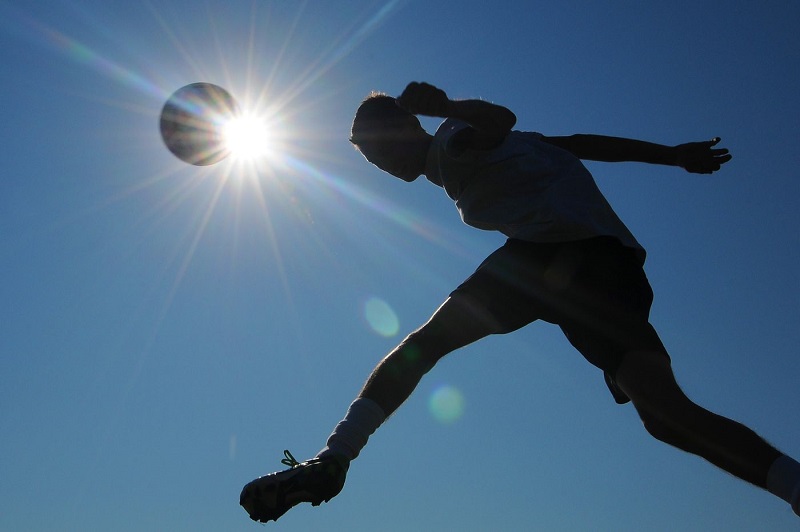Student Athletes Shouldn’t Have to Suffer from Heat Stroke. Here’s What We Can Do About It.

Deignan: We have the opportunity to pass legislation addressing high heat conditions and humidity levels present during practices and games. (AP Photo/Salina Journal 2011 file photo by Tom Dorsey ) (BIR_AP)
It almost happened again. Sudden cardiac arrest, a leading cause of death in American schools, almost stole another life of a student athlete. Thankfully, the student’s coach jumped to action. The combination of CPR with a jolt to the heart from a defibrillator, and another young life was saved.
Approximately 7,000 children fall victim to sudden cardiac arrest — SCA — each year. Even after the required physicals, these healthy children who don’t have heart condition symptoms still fall victim. No parent would ever imagine their child’s participation in school athletics would lead to such a tragic outcome, and no parent should have to face this heartbreak.
The general public mistakenly views heart conditions as something that only develops with age, not with our youth. SCA, however, takes at least one young life every four days in our country. A few years ago, SCA stole the lives of two young men in my district, Edison High School’s Kittim Sherrod and Brandon James. Both were later diagnosed with hypertrophic cardiomyopathy.
Fortunately, there are preventative measures, but action was needed in the state Legislature to make sure the proper steps were taken. That’s what prompted me to sponsor and pass Janet’s Law — written to help prevent the death of students stricken by emergency cardiac situations. Janet’s Law requires all public schools, K-12, to be properly equipped with automated external defibrillators located in easily accessible locations during the school day and during all school sponsored events. It ensures staff and coaches are certified in CPR and how to properly us a defibrillator.
Janet’s Law, named after Janet Zilinski, an 11-year-old resident from Warren who died of SCA following cheerleading practice in 2006, has saved the lives of students throughout the state since its enactment. Defibrillators located in schools and on site at school sporting events have provided the opportunity for life saving action to be administered without delay.
Jake McMahon was saved as a senior at Glen Rock High when he collapsed a few years ago during a soccer game after the ball struck his chest. Anthony Cortazzo was saved as a junior at Pascack Hills High School when he collapsed during track and field practice. Gabriela Kaziol, this year, was a freshman at Garfield High School when she collapsed during soccer practice on the first day of school. All three healthy student athletes stricken with SCA are alive today thanks to the lifesaving standards set in place by Janet’s Law.
Janet’s Law has provided miracles to families throughout our state, and for that, I am grateful. However, the success of Janet’s Law should not be where we stop in our mission to improve the safety standards present at student athletic fields.
We have the opportunity to pass legislation addressing high heat conditions and humidity levels present during practices and games. This past September, five students at the Bergen Arts and Science Charter School in Hackensack suffered heat stroke while running outside during gym class in temperatures over 90 degrees. This is the type of negligence and irresponsibility we need to prevent.
The health and well-being of our students must be the priority when determining if field conditions are safe.
Legislation I introduced last year, S2443, addresses the risk of dangerous heat and humidity levels at school athletic fields and would require every school district which is a member of the New Jersey Interscholastic Athletic Association to adopt the association’s Heat and Humidity Practice Policy. The bill would see Wet-Bulb Globe Temperature monitoring tools present at every athletic field to measure the level of heat stress present.
This would greatly reduce the dangers when determining the safety of the conditions. The implemented policy has guidelines addressing workouts during high heat and humid conditions, proper hydration and properly determining cancelling practices and games on account of these conditions.
This will bring our schools up to the necessary standards already in place during hundreds of organized games and tournaments in the state regulated by the NJSIAA.
Story Credit: https://www.nj.com/opinion/2019/01/nj-lawmaker-student-athletes-shouldnt-have-to-suffer-from-heat-stroke-heres-what-we-can-do-about-it.html
Since you’re here, we have a small favor to ask. Requests from schools and districts for our screening services are growing, which means that the need for funds to cover the cost of those services is also growing. We want to make our services available to those who request it and beyond, so you can see why we need your help. Safebeat heart screenings take a lot of time, money, and hard work to produce but we do it because we understand the value of a child's life, PRICELESS!
If everyone who reads this likes it and helps fund it, our future would be more secure. For as little as $1, you can support Safebeat and it only takes a minute. Make a contribution. -The SafeBeat Team


